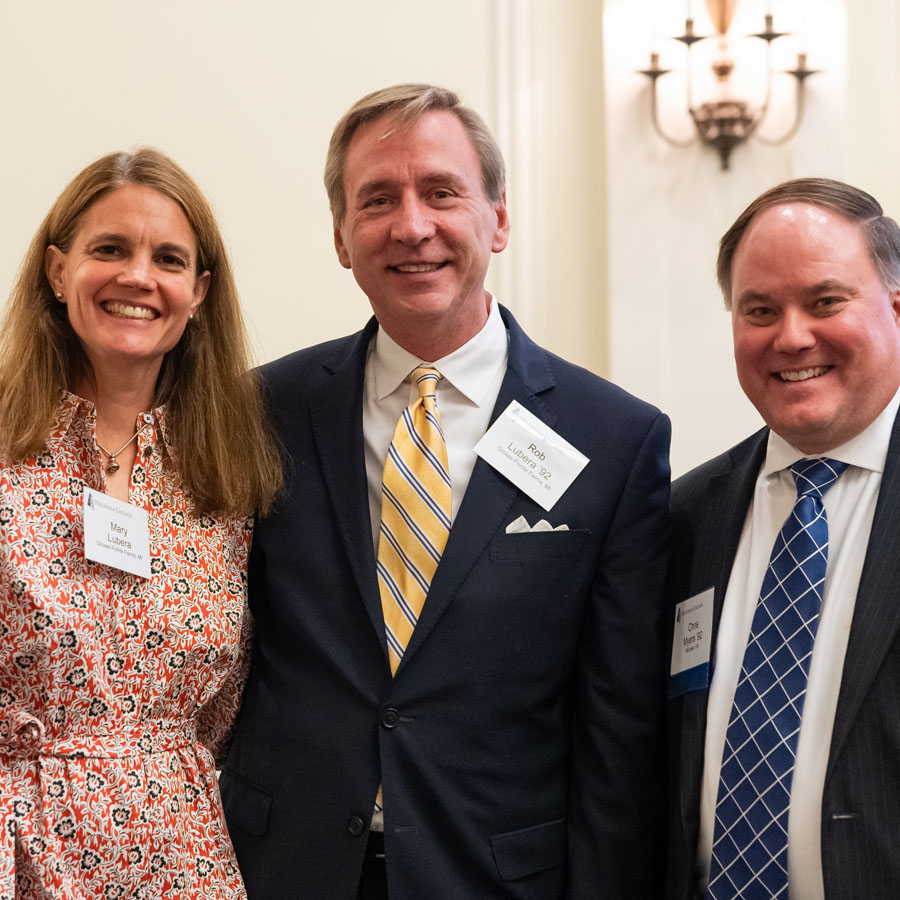
Christopher Myers, ’92, is a translator—but not of a foreign language. As the director of International and Federal Government Affairs, Global Government and Corporate Affairs for Caterpillar, Myers “translates” between business and politics in his role as a lobbyist in Washington, D.C.
“The business community has a way of thinking and doing things typically very differently from the way Washington and the federal government work,” said Myers, who has had his role with Caterpillar for the past 18 years. “Capitol Hill policymakers often don’t understand how business is thinking and makes decisions. Understanding how both work, I’m typically translating what business is doing to the people on Capitol Hill, and likewise explaining what’s going on in Capitol Hill to the folks in business so both sides understand each other. That’s a simple explanation of what I do.”
Myers got his start as an intern in the Washington-Hillsdale Internship Program. During his college recruitment process, WHIP was a strong influence in his decision to attend Hillsdale.
Even before applying for WHIP, he visited D.C. to see what the current class of interns was experiencing. One of those students was Joe Cella, ’91, who eventually became an ambassador to Fiji under the Donald Trump administration.
“I tagged along with them a little bit, and went back to school and talked with Dr. (Mickey) Craig,” Myers said. “He was very helpful.”
When then-longtime Texas Congressman Dick Armey came to the Hillsdale campus for a special taping of the Firing Line television show in 1990, Myers was among a group of students who met with him.
“I remember him pointing at each one of us and saying, ‘It’s going to take people like you coming to Washington to fix the mess that we’re in right now,’” Myers said of Armey.
That convinced Myers to apply to WHIP, and he was accepted and started in January of 1991 working for then-Vice President Dan Quayle in his Office of Advance.
“His staff goes out to prepare for when the vice president travels or has speaking engagements,” Myers said of the office’s role. “So when he arrived, everything was planned ahead of time.”
However, two weeks into his internship, the Gulf War broke out, and President Bush and Vice President Quayle did not travel outside of Washington for security reasons.
“It was still a very active and great internship all around,” Myers said. “We were in the middle of a lot of the action.”
He said the WHIP experience prepared him for life after college, and he knew he would return to D.C. at some point.
“The big takeaway I have from (WHIP), is I came back with a really new sense of purpose for my senior year. I knew what was waiting for me on the other side, and I was excited to get there.”
He decided not to return immediately to D.C. and took a sales job in the Detroit area for about a year. After the 1992 election, Myers decided it was time to go to D.C. and find his future. He volunteered for Armey at the House Republican Conference Office while looking for a full-time paying position. A fellow WHIP intern connection landed him a job in Congressman Phil Crane’s office. He spent seven years there, eventually becoming Crane’s chief of staff.
Myers then went back into the private sector and became a lobbyist for the U.S. Chamber of Commerce, where he worked for five years before joining Caterpillar.
Myers specializes in corporate tax policies and tax law.
“How is this going to impact business? I engage with policy makers to help them understand,” he said. “We work through some ways to improve bad policies and pass good ones.”
Working directly with members of Congress, as well as the Treasury Department and other groups like trade associations, is a routine part of his job.
He and his wife, Amy, whom he met at an event while working in Crane’s office, have three children and reside in McLean, Virginia. The political economy and German double major and Sigma Chi fraternity member said WHIP—and Hillsdale College—have been invaluable to his personal and professional life.
“I think the quality education that Hillsdale gives is so far and above other schools,” said Myers, who loves to read, especially anything about Winston Churchill. “It has been miraculous how Hillsdale has been able to help me over the years.”